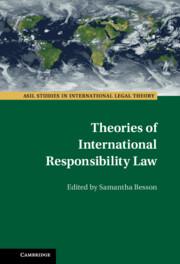Book contents
- Theories of International Responsibility Law
- ASIL Studies in International Legal Theory
- Theories of International Responsibility Law
- Copyright page
- Contents
- Contributors
- Preface
- Theorizing International Responsibility Law, an Introduction
- Part I International Responsibility of Public Institutions: Public and/or Private?
- 1 From ‘Respondere’ to ‘Responsibility’
- 2 Change in the Law of International Responsibility
- 3 State Responsibility
- 4 Responsibility of States for Wrongdoing
- Part II International Responsibility of Public Institutions: Collective and/or Individual?
- Part III International Responsibility of Public Institutions: Fault-based or Not?
- Part IV Responsibility of Public Institutions: A World Tour
- Index
4 - Responsibility of States for Wrongdoing
Who Is to Decide?
from Part I - International Responsibility of Public Institutions: Public and/or Private?
Published online by Cambridge University Press: 01 September 2022
- Theories of International Responsibility Law
- ASIL Studies in International Legal Theory
- Theories of International Responsibility Law
- Copyright page
- Contents
- Contributors
- Preface
- Theorizing International Responsibility Law, an Introduction
- Part I International Responsibility of Public Institutions: Public and/or Private?
- 1 From ‘Respondere’ to ‘Responsibility’
- 2 Change in the Law of International Responsibility
- 3 State Responsibility
- 4 Responsibility of States for Wrongdoing
- Part II International Responsibility of Public Institutions: Collective and/or Individual?
- Part III International Responsibility of Public Institutions: Fault-based or Not?
- Part IV Responsibility of Public Institutions: A World Tour
- Index
Summary
Can States determine unilaterally what counts as a wrongful behaviour in the absence of public international adjudicative institutions? Can meaningful responsibility for wrongful acts exist in the absence of a public adjudicative entity? What happens in the case of a conflict between a unilateral (private) judgment of a State accused of having committed a wrong and the decision of a (public) international adjudicative institution? The authors advocate for a system based on conflicting judgments concerning responsibility made both by international adjudicative institutions (publicly) and by the States themselves (privately), what they refer to as the ‘discordant parity hypothesis’. The case for the overriding power of international adjudicative institutions is based on the importance of the State’s publicly recognized duties. The case for the overriding power of judgments made by States stems from its promise to facilitate active engagement of States with their obligations. The chapter embraces a system that recognizes the normative force of both (and the inevitable resulting conflicts).
Keywords
- Type
- Chapter
- Information
- Theories of International Responsibility Law , pp. 93 - 116Publisher: Cambridge University PressPrint publication year: 2022



